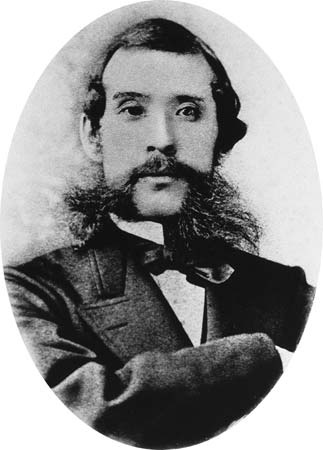Ōkubo Toshimichi
Japanese statesman
born Sept. 26, 1830, Kagoshima, Japan
died May 14, 1878, Tokyo
 Japanese politician and one of the samurai leaders who in 1868 overthrew the Tokugawa family, which had ruled Japan for 264 years, and restored the government of the emperor. After the Meiji Restoration he spent much of his career helping to establish Japan as a progressive nation.
Japanese politician and one of the samurai leaders who in 1868 overthrew the Tokugawa family, which had ruled Japan for 264 years, and restored the government of the emperor. After the Meiji Restoration he spent much of his career helping to establish Japan as a progressive nation.Ōkubo early showed great political acumen and became one of the leading figures in the government of Satsuma, one of the largest and most powerful Japanese feudal domains and a hotbed of anti-Tokugawa sentiment. Although Chōshū, another powerful domain, shared the anti-Tokugawa stand of Satsuma, they were on unfriendly terms with each other. This situation was remedied in 1866, when Ōkubo and Saigō Takamori, another leading figure in the Satsuma government, agreed to an alliance with Chōshū in which both domains determined to cooperate against the Tokugawa.
Shortly thereafter the Tokugawa family was overthrown and Ōkubo became a dominant member of the new imperial government. After a tour of the West, he returned convinced of Japan's need for rapid economic development. To this end he supported the establishment of technical schools, the granting of government loans and subsidies to private business, and the building and managing of factories by the government.
In 1873 he broke with Saigō Takamori over policy toward Korea. Saigō supported a plan of conquest; Ōkubo argued that priority be given to internal Japanese reform and development. Ōkubo's views prevailed and were adhered to until 1894, long after his death. Saigō left the government and returned to his native Satsuma, where he led a short-lived rebellion of dissatisfied samurai. The rebellion was suppressed, but in 1878 Ōkubo was assassinated by discontented samurai.